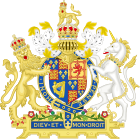Ship Money Act 1640 facts for kids
| Act of Parliament | |

|
|
| Long title | An Act for declaring unlawfull and void the late proceedings touching Ship money and for vacating of all Records and Processe concerning the same. |
|---|---|
| Citation | 16 Cha. 1. c. 14 |
| Dates | |
| Royal assent | 7 August 1641 |
| Other legislation | |
| Repealed by | Statute Law (Repeals) Act 1969 |
|
Status: Repealed
|
|
| Text of statute as originally enacted | |
The Ship Money Act 1640 was an important law passed by the Parliament of England. This law made an old tax called ship money illegal. This tax had caused big problems between the King and Parliament.
Contents
What Was the Ship Money Act?
The Ship Money Act was a law passed in 1640. It was created to stop a special tax called "ship money." This tax was usually collected by the King without asking Parliament. It was a big deal because it showed how the King and Parliament disagreed.
What Was Ship Money?
Ship money was a tax that English kings could collect. It was meant to be used for the navy, especially during wartime. Only towns near the coast were supposed to pay it. This money helped protect England from attacks by sea.
King Charles I and the Tax
By the 1630s, King Charles I started using ship money differently. He began collecting it from all parts of England, not just coastal towns. He also used the money for everyday government costs, not just for war. This made many people, especially Parliament, very angry. They felt the King was taking power that belonged to Parliament.
Why the Act Was Important
The Ship Money Act was a major step. It showed that Parliament wanted to limit the King's power. It made it clear that the King could not just make up taxes. This act was one of the many disagreements that led to the English Civil War.
What Happened to the Act?
Over time, laws can be changed or removed. The Ship Money Act itself was later removed. This happened in 1969 by a law called the Statute Law (Repeals) Act 1969. When a law is "repealed," it means it is no longer in effect.
See also
 | Chris Smalls |
 | Fred Hampton |
 | Ralph Abernathy |

